CXC Home | Search | Help | Image Use Policy | Latest Images | Privacy | Accessibility | Glossary | Q&A
Video Series: Visual Descriptions
Narrated audio files of the visual descriptions of recent Chandra images released.
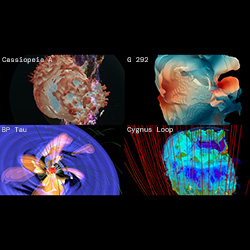
1.- 3D Models
(Wed, 16 Apr 2025 )New three-dimensional (3D) models of objects in space have been released by NASA's Chandra X-ray Observatory. These 3D models allow people to explore – and print – examples of stars in the early and end stages of their lives.
Visual Description Text
More

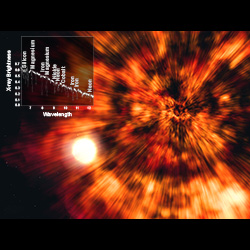
2.- GRO J1655-40
(Thu, 27 Mar 2025 )A team of astronomers has shown that they can use stars and the remains they leave behind to conduct a special kind of archaeology in space.
Visual Description Text
More

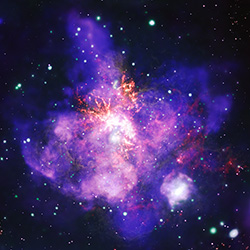
3.- Tarantula Nebula
(Wed, 12 Feb 2025 )A bouquet of thousands of stars in bloom has arrived. This composite image contains the deepest X-ray image ever made of the spectacular star forming region called 30 Doradus.
Visual Description Text
More

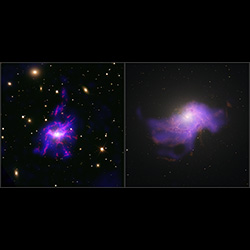
4.- Filaments in Clusters
(Mon, 27 Jan 2025 )Astronomers have taken a crucial step in showing that the most massive black holes in the universe can create their own meals.
Visual Description Text
More

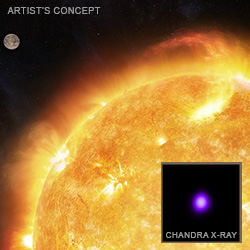
5.- Wolf 359
(Thu, 16 Jan 2025 )A new study examines the effects of X-ray and other high-energy radiation unleashed on potential exoplanets from a host star.
Visual Description Text
More

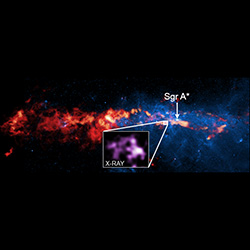
6.- Molecular Clouds in the Center of the Milky Way Galaxy
(Tue, 14 Jan 2025 )A creative new method uses decades of data to learn about the 3D structure of molecular clouds, the birthplace of stars, in the center of the Milky Way.
Visual Description Text
More

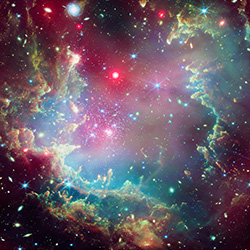
7.- NGC 602
(Tue, 17 Dec 2024 )Since antiquity, wreaths have symbolized the cycle of life, death, and rebirth. It is fitting then that one of the best places for astronomers to learn more about the stellar lifecycle resembles a giant holiday wreath itself.
Visual Description Text
More

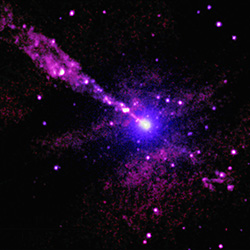
8.- Centaurus A Knots
(Tue, 10 Dec 2024 )Astronomers have found an unusual mark from a giant black hole's powerful jet striking an unidentified object in its path.
Visual Description Text
More

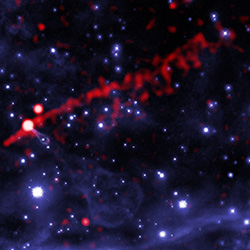
9.- Guitar Nebula
(Wed, 20 Nov 2024 )Normally found only in heavy metal bands or certain post-apocalyptic films, a "flame-throwing guitar" has now been spotted moving through space.
Visual Description Text
More

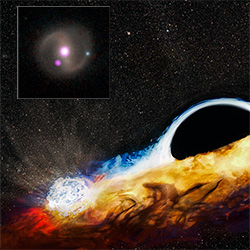
10.- AT2019qiz
(Wed, 09 Oct 2024 )A massive black hole has torn apart one star and is now using that stellar wreckage to pummel another star or smaller black hole that used to be in the clear.
Visual Description Text
More

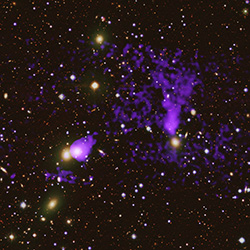
11.- Zwicky 8338
(Thu, 19 Sep 2024 )Astronomers using Chandra have found a galaxy cluster has two streams of superheated gas crossing one another. This result shows that crossing the streams may lead to the creation of new structure.
Visual Description Text
More

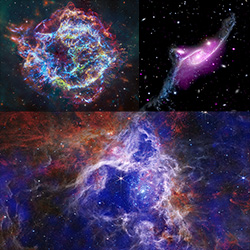
12.- Sonification Collection
(Mon, 26 Aug 2024 )Sonifications of three images have been released to mark the 25th anniversary of Chandra's "First Light" image.
Visual Description Text
More

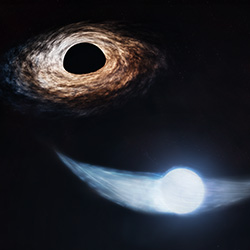
13.- AT2018fyk
(Wed, 14 Aug 2024 )A team of researchers have made important headway in understanding how — and when — a supermassive black hole obtains and then consumes material.
Visual Description Text
More

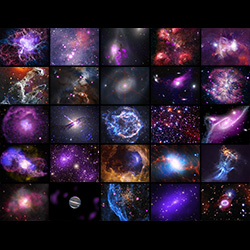
14.- 25 Images for Chandra's 25th Anniversary
(Mon, 22 Jul 2024 )To celebrate the 25th anniversary of its launch, NASA's Chandra X-ray Observatory is releasing 25 never-before-seen views of a wide range of cosmic objects.
Visual Description Text
More

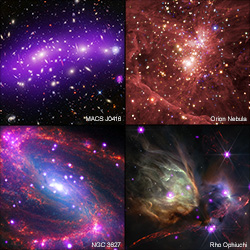
15.- Cosmic Road Trip
(Thu, 11 Jul 2024 )It's time to take a cosmic road trip using light as the highway and visit four stunning destinations across space.
Visual Description Text
More

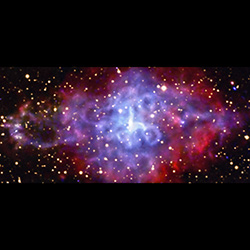
16.- 3C 58
(Thu, 20 Jun 2024 )A new study using NASA's Chandra and ESA's XMM-Newton reveals that the interiors of neutron stars may contain a type of ultra-dense matter not found anywhere else in the Universe.
Visual Description Text
More

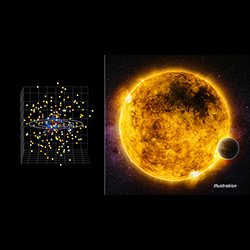
17.- Exoplanet Survey
(Wed, 12 Jun 2024 )This graphic shows a three-dimensional map of stars near the Sun that are close enough to Earth for planets in their habitable zones to be directly imaged using future telescopes.
Visual Description Text
More

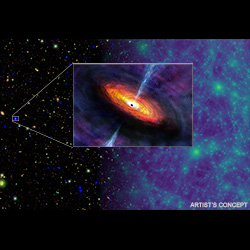
18.- Supermassive Black Hole Survey
(Tue, 11 Jun 2024 )By combining forefront X-ray observations with state-of-the-art supercomputer simulations, researchers have provided the best modeling to date of the growth of the supermassive black holes found in the centers of galaxies.
Visual Description Text
More

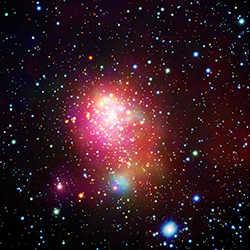
19.- Westerlund 1
(Tue, 04 Jun 2024 )Westerlund 1 is the biggest and closest "super" star cluster to Earth. New data is helping astronomers delve deeper into this galactic factory where stars are vigorously being produced.
Visual Description Text
More

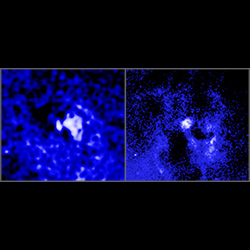
20.- Death Star Black Holes
(Wed, 22 May 2024 )Astronomers studied 16 supermassive black holes that are firing powerful beams, or jets, into space. They found that about a third of these have changed directions by large amounts.
Visual Description Text
More

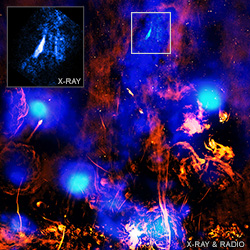
21.- Galactic Center Vent
(Thu, 09 May 2024 )Eruptions from the supermassive black hole Sagittarius A* may have created an exhaust vent attached to a "chimney" of hot gas blowing away from the center of our Milky Way galaxy.
Visual Description Text
More

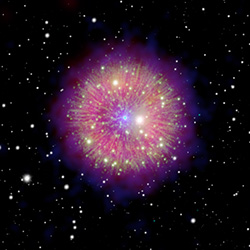
22.- SNR 1181
(Wed, 27 Mar 2024 )In the year 1181 a rare supernova explosion appeared in the night sky, staying visible for 185 consecutive days. Now we can marvel at the same object that appeared in our ancestors' night sky more than 800 years ago.
Visual Description Text
More

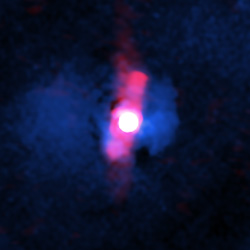
23.- H1821+643
(Thu, 21 Mar 2024 )A brilliant supermassive black hole is not living up to expectations. Although it's responsible for high levels of radiation and powerful jets, this giant black hole is not as influential as many of its counterparts in other galaxies.
Visual Description Text
More

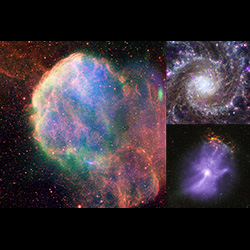
24.- Sonification Collection
(Wed, 28 Feb 2024 )Three new sonifications of images from NASA's Chandra X-ray Observatory and other telescopes have been released in conjunction with a new documentary about the project that makes its debut on the NASA+ streaming platform.
Visual Description Text
More

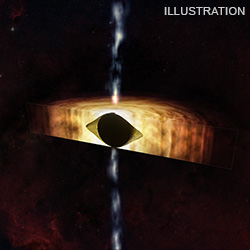
25.- Sagittarius A*
(Thu, 08 Feb 2024 )The supermassive black hole in the center of the Milky Way is spinning so quickly it is warping the spacetime surrounding it into a shape that looks like an American football.
Visual Description Text
More

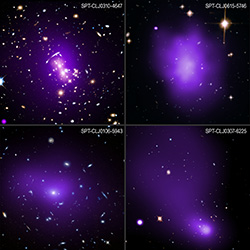
26.- Brightest Cluster Galaxies Survey
(Thu, 11 Jan 2024 )These four images represent a sample of galaxy clusters that are part of the largest and most complete study to learn what triggers stars to form in the universe's biggest galaxies.
Visual Description Text
More

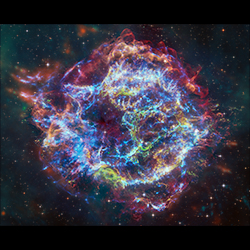
27.- Cassiopeia A
(Mon, 08 Jan 2024 )Astronomers have combined data from NASA's Chandra X-ray Observatory and James Webb Space Telescope to study the well-known supernova remnant Cassiopeia A.
Visual Description Text
More

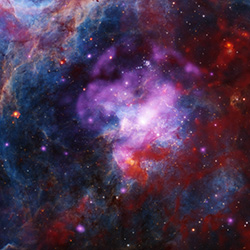
28.- 30 Doradus B
(Wed, 03 Jan 2024 )A colorful, festive image shows different types of light containing the remains of not one, but at least two, exploded stars.
Visual Description Text
More

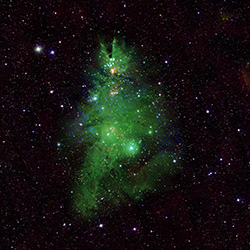
29.- NGC 2264
(Tue, 19 Dec 2023 )This new image of NGC 2264, also known as the "Christmas Tree Cluster," shows the shape of a cosmic tree with the glow of stellar lights.
Visual Description Text
More

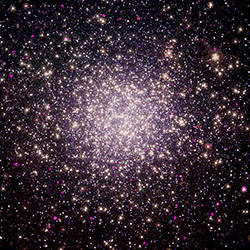
30.- Omega Centauri
(Thu, 30 Nov 2023 )A group of dead stars known as "spider pulsars" are obliterating companion stars within their reach.
Visual Description Text
More

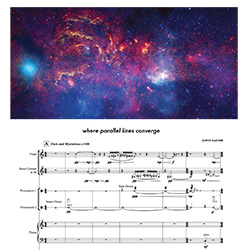
31.- Galactic Center
(Wed, 15 Nov 2023 )A new collaboration is enabling actual data from NASA telescopes to be used as the basis for original music that humans can play.
Visual Description Text
More

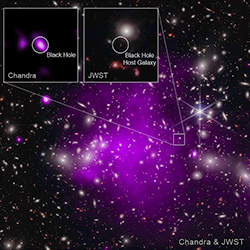
32.- UHZ1
(Mon, 06 Nov 2023 )This image contains the most distant black hole ever detected in X-rays, a result that may explain how some of the first supermassive black holes in the universe formed.
Visual Description Text
More

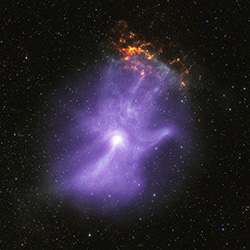
33.- MSH 15-52
(Mon, 30 Oct 2023 )Chandra's data of MSH 15-52 have been combined with data from NASA's newest X-ray telescope, IXPE to unveil the magnetic field "bones" of this remarkable structure.
Visual Description Text
More

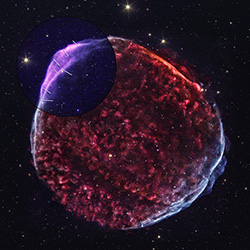
34.- SN 1006
(Thu, 26 Oct 2023 )Supernova 1006 was first seen in the sky on May 1, 1006 A.D. Today, scientists are learning even more about the spectacular stellar explosion documented in many parts of the world.
Visual Description Text
More

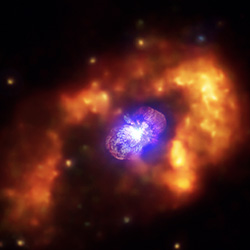
35.- Eta Carinae
(Tue, 26 Sep 2023 )A time-lapse sequence of Eta Carinae allows astronomers to watch as the stellar eruption continues to expand into space at speeds up to 4.5 million miles per hour.
Visual Description Text
More

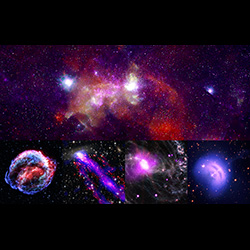
36.- Chandra Archive Collection
(Wed, 13 Sep 2023 )A new collection of stunning images highlights data from NASA's Chandra X-ray Observatory and other telescopes.
Visual Description Text
More


37.- ASASSN-14li
(Tue, 22 Aug 2023 )Astronomers using NASA's Chandra, ESA's XMM-Newton, and other telescopes have determined that a giant black hole has destroyed a large star and strewn its contents into space.
Visual Description Text
More

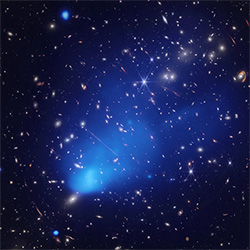
38.- El Gordo
(Wed, 02 Aug 2023 )New studies using NASA's Chandra X-ray Observatory & James Webb Space Telescope provide further insights into this hefty galaxy cluster.
Visual Description Text
More

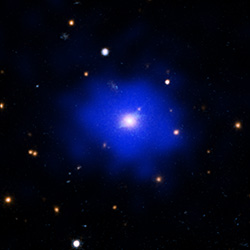
39.- SPT-CL J2215-3537
(Thu, 20 Jul 2023 )Astronomers have discovered the most distant galaxy cluster with an important quality — paving the way to learning how and when some of these gigantic structures form and why the universe looks like it does in the present day.
Visual Description Text
More

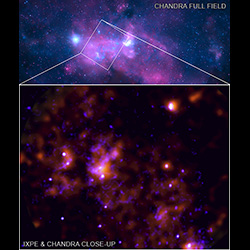
40.- Sagittarius A*
(Wed, 21 Jun 2023 )New data from IXPE has provided evidence that our Milky Way's supermassive black hole, Sagittarius A*, had an outburst about 200 years ago after devouring gas and dust within its reach.
Visual Description Text
More

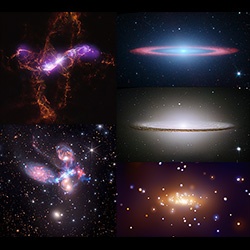
41.- Sonification Collection
(Tue, 20 Jun 2023 )Sonification is a process that translates data into sounds and notes that humans can hear. Each layer of sound in these three new NASA sonifications represents particular wavelengths of light detected by Chandra, Webb, Hubble, and Spitzer in various combinations.
Visual Description Text
More

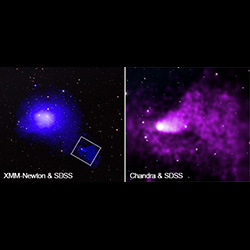
42.- NGC 4839
(Tue, 06 Jun 2023 )The NGC 4839 group of galaxies is plunging into the Coma galaxy cluster and leaving behind a tail of superheated gas.
Visual Description Text
More

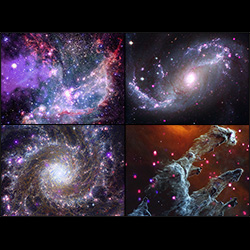
43.- Chandra and Webb
(Tue, 23 May 2023 )4 composite images deliver dazzling views from NASA's Chandra X-ray Observatory and James Webb Space Telescope of two galaxies, a nebula, and a star cluster.
Visual Description Text
More

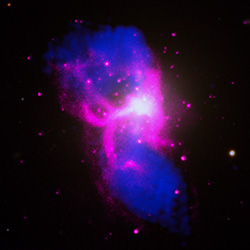
44.- M84
(Thu, 04 May 2023 )With a single letter seemingly etched in the X-ray glow around it, a giant black hole at the center of a massive elliptical galaxy is making a mark on its surroundings.
Visual Description Text
More


45.- Centaurus A
(Tue, 02 May 2023 )The galaxy Centaurus A shines bright in this image combining data from multiple observatories.
Visual Description Text
More

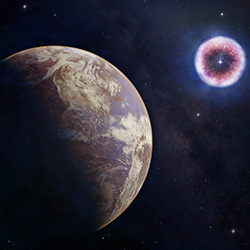
46.- Supernova Survey
(Thu, 20 Apr 2023 )Astronomers have identified a new threat to life on planets like Earth: a phase during which intense X-rays from exploded stars can affect planets over 100 light-years away.
Visual Description Text
More

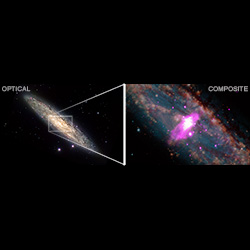
47.- NGC 253
(Wed, 29 Mar 2023 )Data from Chandra show the effects of powerful winds launched from the center of a nearby galaxy.
Visual Description Text
More

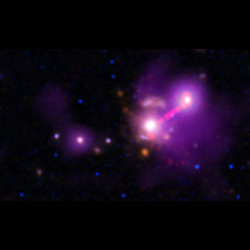
48.- 3C 297
(Wed, 08 Mar 2023 )A distant and lonely galaxy appears to have pulled in and assimilated all of its former companion galaxies.
Visual Description Text
More

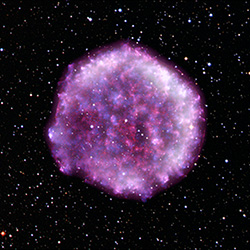
49.- Tycho's Supernova Remnant
(Tue, 28 Feb 2023 )This image provides a new look at the Tycho supernova remnant, named for Danish astronomer Tycho Brahe who noticed the bright glow of this new "star" in the constellation Cassiopeia more than 450 years ago.
Visual Description Text
More

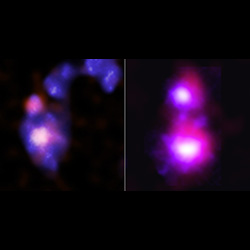
50.- Black Hole Pairs
(Wed, 22 Feb 2023 )A new study using NASA's Chandra X-ray Observatory has tracked two pairs of supermassive black holes in dwarf galaxies on collision courses.
Visual Description Text
More

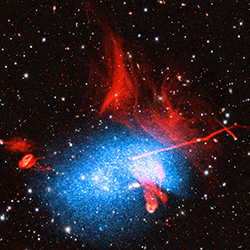
51.- Abell 2256
(Mon, 30 Jan 2023 )Astronomers have captured a spectacular, ongoing collision between at least three galaxy clusters. Data from Chandra, XMM-Newton, and a trio of radio telescopes are helping astronomers sort out what is happening in this jumbled scene.
Visual Description Text
More

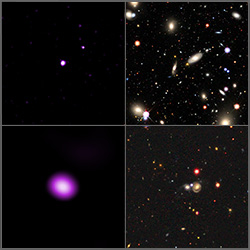
52.- XBONGS
(Wed, 11 Jan 2023 )A new survey using NASA's Chandra X-ray Observatory has uncovered hundreds of previously "hidden" black holes.
Visual Description Text
More


53.- Tarantula Nebula
(Mon, 09 Jan 2023 )The "Tarantula Nebula" (officially known as 30 Doradus) is available in a composite image of Chandra and JWST data for the first time.
Visual Description Text
More

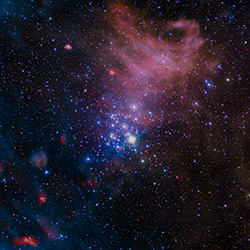
54.- NGC 3293
(Thu, 15 Dec 2022 )This stellar cluster is one of 10 different systems that astronomers studied with Chandra to determine how magnetically active their stars are.
Visual Description Text
More

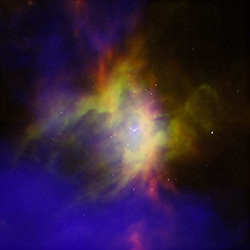
55.- RCW 36
(Tue, 29 Nov 2022 )A study of RCW 36 shows that stars in a cluster can limit how many new stars form when the biggest and brightest members expel most of the gas from the system, thus drastically slowing down star birth.
Visual Description Text
More

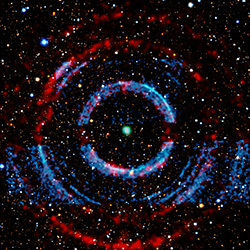
56.- V404 Cygni
(Mon, 21 Nov 2022 )A new sonification turns light echoes from a black hole into sound.
Visual Description Text
More

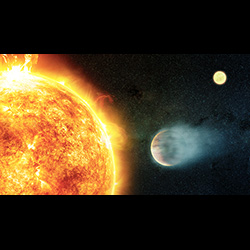
57.- Hot Jupiters
(Wed, 02 Nov 2022 )A new study using Chandra examines whether "hot Jupiter" exoplanets can have an anti-aging effect on the stars they orbit.
Visual Description Text
More

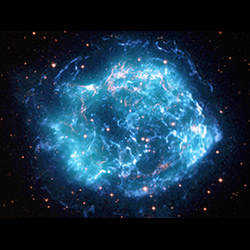
58.- Cassiopeia A
(Tue, 18 Oct 2022 )Astronomers have made the first measurement in X-rays of the polarization from the remains of an exploded star called Cassiopeia A.
Visual Description Text
More

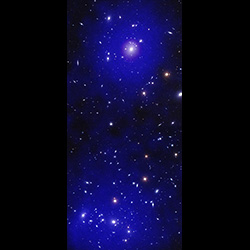
59.- Abell 98
(Thu, 13 Oct 2022 )Astronomers taking inventory of the material in the local universe keep coming up short. A new result from NASA's Chandra X-ray Observatory about a system of colliding galaxy clusters may help explain this shortfall.
Visual Description Text
More

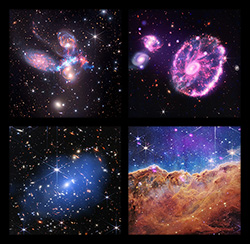
60.- Chandra and Webb
(Tue, 04 Oct 2022 )Images combining Webb infrared data with X-rays collected by Chandra underscore how the power of any of these telescopes is only enhanced when joined with others.
Visual Description Text
More

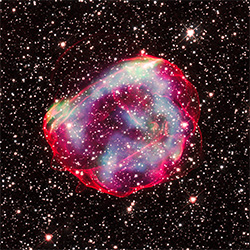
61.- SNR 0519-69.0
(Mon, 12 Sep 2022 )It is often difficult to determine the timeline of a star's demise. By studying the spectacular remains of a supernova, a team has found enough clues to help wind back the clock.
Visual Description Text
More

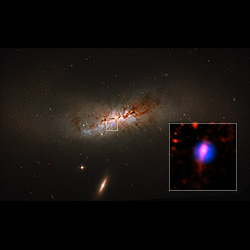
62.- NGC 4424
(Thu, 18 Aug 2022 )Astronomers may have witnessed a smaller galaxy colliding with a larger spiral galaxy and delivering a supermassive black hole.
Visual Description Text
More

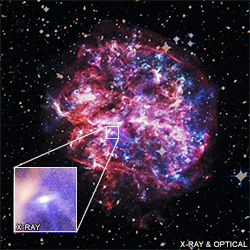
63.- G292.0+1.8
(Wed, 15 Jun 2022 )A young pulsar is blazing through the Milky Way at a speed of over a million miles per hour. This stellar speedster is one of the fastest objects of its kind ever seen.
Visual Description Text
More

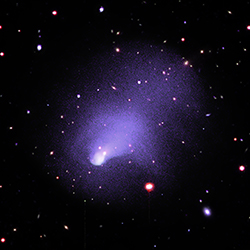
64.- Abell 2146
(Tue, 07 Jun 2022 )A new study shows a deep connection between some of the largest, most energetic events in the Universe and much smaller, weaker ones powered by our own Sun.
Visual Description Text
More

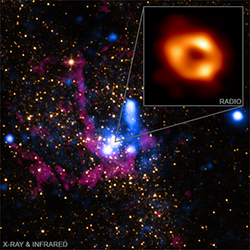
65.- Sagittarius A*
(Thu, 12 May 2022 )As the Event Horizon Telescope was collecting data for its remarkable new image of the Milky Way's supermassive black hole, a legion of other telescopes, including Chandra, was also watching.
Visual Description Text
More

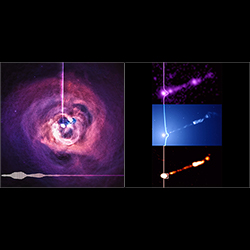
66.- Sonification Collection
(Wed, 04 May 2022 )Two new sonifications of well-known black holes have been released for NASA's Black Hole Week.
Visual Description Text
More

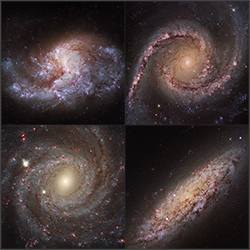
67.- Black Hole Survey
(Wed, 20 Apr 2022 )A new survey of over 100 galaxies by NASA's Chandra X-ray Observatory has uncovered signs that black holes are demolishing thousands of stars in a quest to pack on weight.
Visual Description Text
More

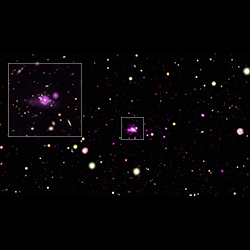
68.- Spiderweb Galaxy Field
(Thu, 31 Mar 2022 )Data from Chandra reveal feasting and growing black holes throughout the cosmic web that surrounds a central galaxy.
Visual Description Text
More

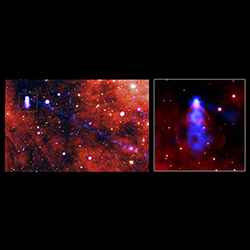
69.- PSR J2030+4415
(Mon, 14 Mar 2022 )A city-sized collapsed star has generated a beam of matter and antimatter that stretches for trillions of miles.
Visual Description Text
More

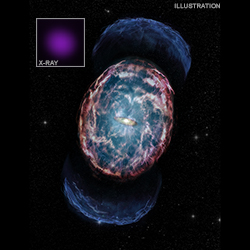
70.- GW170817
(Mon, 28 Feb 2022 )A neutron star merger that produced both gravitational waves and light.
Visual Description Text
More


71.- Chandra Archive Collection
(Wed, 02 Feb 2022 )A selection of multiwavelength images with Chandra data.
Visual Description Text
More


72.- Eta Carinae
(Tue, 25 Jan 2022 )A new astronomical visualization from NASA's Universe of Learning showcases the multiwavelength emissions and 3D structures surrounding Eta Carinae, one of the most massive and eruptive stars in our galaxy.
Visual Description Text
More

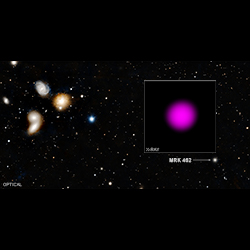
73.- Mrk 462
(Mon, 10 Jan 2022 )Chandra has detected X-rays from the dwarf galaxy Mrk 462, revealing the presence of a growing supermassive black hole.
Visual Description Text
More

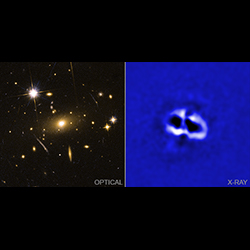
74.- RBS 797
(Thu, 16 Dec 2021 )Scientists have found four enormous cavities, or bubbles, at the center of a galaxy cluster using NASA's Chandra X-ray Observatory.
Visual Description Text
More

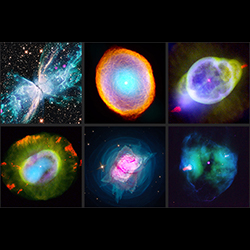
75.- Planetary Nebula Archive
(Mon, 06 Dec 2021 )A collection of six planetary nebulas ranging from about 2,200 to 5,700 light years from Earth.
Visual Description Text
More

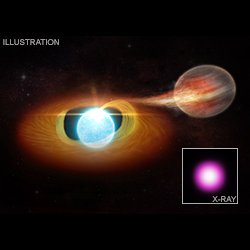
76.- KPD 0005+5106
(Mon, 22 Nov 2021 )New data suggest a white dwarf is blasting a companion object, either a low-mass star or planet, with waves of heat and radiation while pulling it apart through gravitational force.
Visual Description Text
More

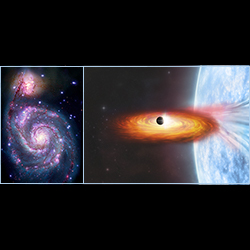
77.- Whirlpool Galaxy
(Mon, 25 Oct 2021 )Astronomers have found evidence for a possible planet candidate in the M51 ("Whirlpool") galaxy, representing what could be the first planet detected outside of the Milky Way.
Visual Description Text
More

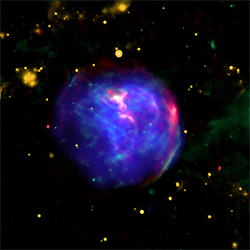
78.- G344.7-0.1
(Tue, 12 Oct 2021 )Studies of the elements left behind by explosions like this are some of the best tools available to scientists to better understand the details of Type Ia supernovas.
Visual Description Text
More

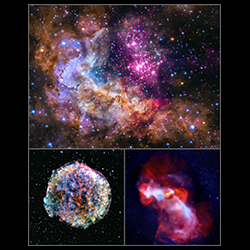
79.- Sonification Collection
(Thu, 16 Sep 2021 )A "sonification" project led by NASA's Chandra X-ray Observatory and the Universe of Learning transforms otherwise inaudible data from some of the world's most powerful telescopes into sound.
Visual Description Text
More

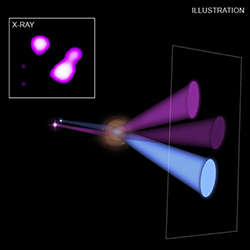
80.- MG B2016+112
(Tue, 31 Aug 2021 )By taking advantage of a natural lens in space, astronomers have captured an unprecedented look at X-rays from a black hole system in the early Universe.
Visual Description Text
More

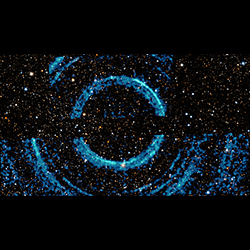
81.- V404 Cygni
(Thu, 05 Aug 2021 )A spectacular set of rings around a black hole has been captured using NASA's Chandra X-ray Observatory and Neil Gehrels Swift Observatory.
Visual Description Text
More

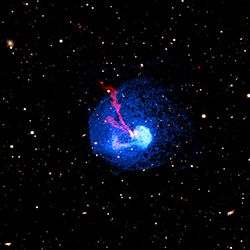
82.- Abell 1775
(Thu, 15 Jul 2021 )Galaxy clusters are the titans of the Universe. A new study using NASA's Chandra X-ray Observatory examines the repercussions after two galaxy clusters clashed.
Visual Description Text
More

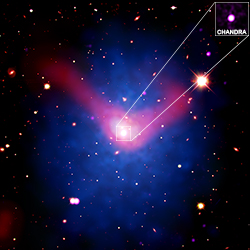
83.- Northern Clump
(Fri, 02 Jul 2021 )Researchers have found a galaxy cluster acting like a passenger on what astronomers are calling an "intergalactic highway."
Visual Description Text
More


84.- MSH 15-52
(Thu, 24 Jun 2021 )Motions of a remarkable cosmic structure have been measured for the first time, using NASA's Chandra X-ray Observatory.
Visual Description Text
More

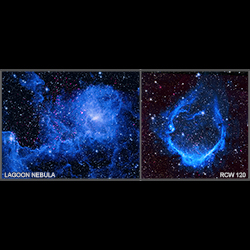
85.- Super Flares
(Wed, 16 Jun 2021 )The largest survey ever of star-forming regions in X-rays outlines the link between very powerful flares and the impact they could have on planets in orbit around them.
Visual Description Text
More


86.- Galactic Center
(Thu, 27 May 2021 )A new panorama from NASA's Chandra X-ray Observatory and the MeerKAT radio telescope provides a stunning view of the center of our Milky Way galaxy.
Visual Description Text
More

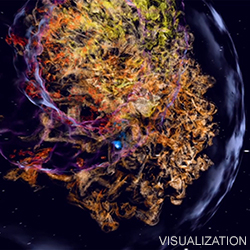
87.- IC 443
(Thu, 20 May 2021 )Chandra's collection of 3D computer models and prints is now available on a new platform from the Smithsonian Institution. This will provide greater access to these resources for libraries, museums, scientists, and the public.
Visual Description Text
More


88.- Cassiopeia A
(Wed, 21 Apr 2021 )Astronomers have discovered an important type of titanium blasting out from the center of the supernova remnant Cassiopeia A, a result that could be a major advance in understanding how some massive stars explode.
Visual Description Text
More

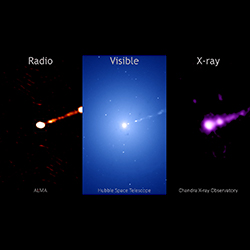
89.- M87
(Wed, 14 Apr 2021 )In April 2019, scientists released the first image of a black hole in the galaxy M87 using the Event Horizon Telescope (EHT). However, that remarkable achievement was just the beginning of the science story to be told.
Visual Description Text
More

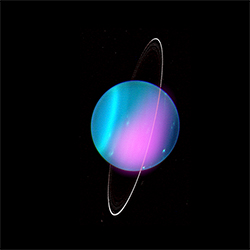
90.- Uranus
(Wed, 31 Mar 2021 )Astronomers have detected X-rays from Uranus for the first time, using NASA's Chandra X-ray Observatory.
Visual Description Text
More

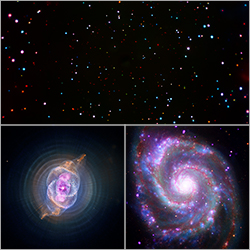
91.- Sonification Collection
(Wed, 24 Mar 2021 )As part of our ongoing data sonification series, three new images have now been released.
Visual Description Text
More

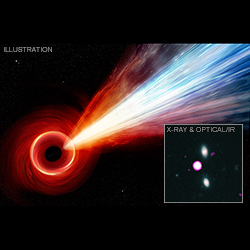
92.- PJ352-15
(Tue, 09 Mar 2021 )Astronomers may have found the most distant supermassive black hole with a jet detected in X-rays using NASA's Chandra X-ray Observatory.
Visual Description Text
More

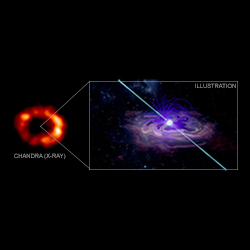
93.- Supernova 1987A
(Tue, 23 Feb 2021 )Astronomers have found evidence for the existence of a neutron star at the center of Supernova 1987A (SN 1987A), which scientists have been seeking for over three decades.
Visual Description Text
More

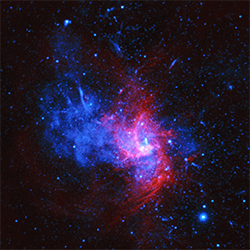
94.- Sagittarius A East
(Mon, 08 Feb 2021 )Astronomers have found evidence for an unusual type of supernova near the center of the Milky Way galaxy.
Visual Description Text
More

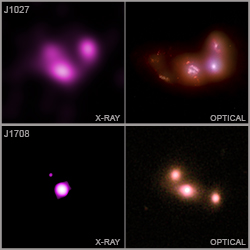
95.- Triple Galaxy Mergers
(Thu, 14 Jan 2021 )When three galaxies collide, what happens to the central black holes growing at the cores of each?
Visual Description Text
More

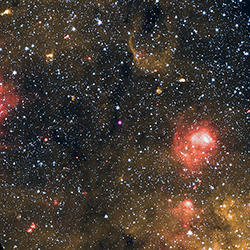
96.- J1818.0-1607
(Fri, 08 Jan 2021 )In 2020, astronomers added a new member to an exclusive family of exotic objects with the discovery of a magnetar. New Chandra observations help support the idea that it is also a pulsar.
Visual Description Text
More



